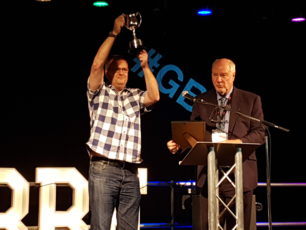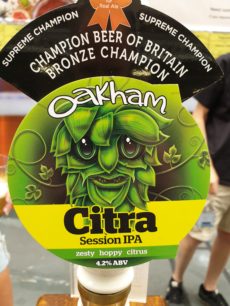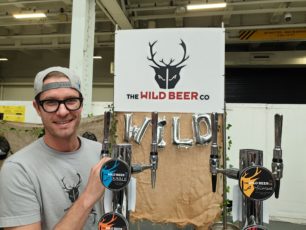Great British Beer Festival 2019
One of the UK’s biggest celebrations of beer took place earlier this month. CAMRA’s Great British Beer Festival (GBBF) offered thirsty visitors a choice of over 1000 beers from more than 250 breweries. While many were from the UK, there were also beers from around the world, including US cask ales. Following successful offerings last year, a dedicated Wine & Gin bar featured a daily-changing list of brewery-produced guest gins.
Key Kegs at the Beer Festival
CAMRA, The Campaign for Real Ale, has been taking steps to modernise its image and consequently make itself more relevant to modern beer drinkers. So, for the first time in its history, the GBBF featured a CAMRA-run live key keg bar with beers from nearly 30 UK breweries. Additionally, there were a further four brewery bars using key kegs (The Wild Beer Co., Magic Rock Brewing, Tiny Rebel and Siren Craft Brew). All these beers were unpasteurised and served without addition of extraneous gases. Therefore, they constitute ‘real ale’, according to the campaign group’s definition. Also, the plastic key kegs used were recyclable with the recycling process beginning on-site at the festival.
The Value of Beer
Mike Wood MP, Chair of the All-Party Parliamentary Beer Group, spoke about the beer industry’s importance for the UK economy. “British beer and pubs are a force for economic good“, he stressed. “They contribute nearly £13bn to the Exchequer, employ nearly one million people and beer is one of our largest growing exports.”
Beer Education
In another pragmatic move, a new Discovery Zone offered visitors the chance to meet brewers. Here they could learn more about the brewing process and dispense methods. Alex Metcalfe, Learn & Discover Manager at CAMRA said: “The idea is to help anyone become a beer connoisseur, to make the information accessible and available to all. Beer can be seen as an exclusive or ‘geeky’ hobby, which can be off-putting when a novice is trying to decide what to order at the bar. As a consumer organisation, we want to provide all the resources available to help more people feel informed and confident about their favourite drink.”
Inclusivity
CAMRA banned beers with discriminatory names or artwork at the GBBF, following on from its policy launched last year. A YouGov survey found 68% of female drinkers who expressed an opinion would be unlikely to buy a beer they were planning to buy if they saw an advert for it which they considered sexist. Abigail Newton, CAMRA National Director said: “We need to do more to encourage female beer drinkers, which are currently only 17% of the population, despite the fact that they make up more than 50% of the potential market. Beer is not a man’s drinks or a woman’s drink. It’s a drink for everyone. There is a huge amount of work that needs to be done to overcome outdated stereotypes.”
Diversity
“GBBF has always been a festival that offers visitors an incredible amount of choice“, announced Catherine Tonry, CAMRA’s Festivals Director. “We’re proud of our diverse range of real ale, cider and perry. This year is no exception. In fact, for 2019, diversity has defined our festival.” Therefore, Stonewall, whose motto is ‘acceptance without exception’, was the chosen charity for 2019.
Champion Beer of Britain Competition
One of the main events at the festival is the announcement of the prestigious Champion Beer of Britain (CBOB) medallists. Surrey Hills Brewery won the 2019 Supreme Champion Trophy for Shere Drop (4.2% ABV), winner of the individual Best Bitter Category. Grey Trees took second place overall for Afghan Pale (5.4% ABV), winner of the Strong Bitter Category. Oakham Ales scooped the bronze medal for Citra (4.2% ABV), also awarded best Golden Ale.

Ross Hunter, owner of Surrey Hills Brewery, collecting his Supreme Champion Beer of Britain Trophy
Supreme Champion Winners
Surrey Hills is based on the Denbies Wine Estate, having moved there in 2011. Owner Ross Hunter was in jubilant mood on hearing the result, but completely taken aback by this success. “We’re in a bit of shock“, he commented. “We brew consistently high quality beers but you never think you’re going to be top of the tree. It’s a complete surprise! The thing I’m most proud of is that we’ve reached the finals of the CBOB competition most years that we’ve been going. This means we’re doing something right!” Shere Drop is a more traditional style of beer with plenty of malty flavour complementing the bitter hop character. “This is a more balanced beer and one of our least hoppy ones, which is slightly surprising in the modern era. It’s not boring – it has good balance between the hops and the malt.”

Ray Davies of Grey Trees Brewery
Tracy Davies, Brewery Manager and Co-Director of Grey Trees, comments on the Welsh brewery’s Supreme Champion runners-up result. “We’re a small brewery, six years old. We just turned up and were congratulated with the news that we’ve won Silver Overall Champion Beer of Britain. This is completely overwhelming! We’ve won some regional awards that we’re really proud of. To win this is superb, which makes it all worthwhile!

Oakham Citra
Oakham Citra is an iconic British beer. It’s known and loved by many beer drinkers for its citrus and tropical hop flavours. Winner of the Silver Trophy in 2014, this was the first UK beer brewed with 100% Citra hops.
Wild Beer at the Great British Beer Festival
Seven years ago, Brett Ellis and Andrew Cooper founded The Wild Beer Co., one of the UK’s most innovative craft breweries. Heavily inspired by sour beer production in the US and Belgium, the company focuses on barrel-aged sours and wild beers. Ryebeck spoke with Brett at this year’s festival, where the company had its own dedicated bar.
“We could see the drinking public were ready to be taken on a journey that they wanted to be involved in. So we set up a brewery to explore that and have a positive impact on the evolution of beer drinking in this country. On this evolution, we were really focussed on flavour and beer as a way to transport it. So we looked at different fruits, yeasts and bacteria that are used around the world to make different flavours in beer.”

Brett Ellis from The Wild Beer Co.
“Being a wild brewery, we really try to be inclusive and not exclusive. Everybody in the world has a sense of what it means to be wild – whether that means climbing Mount Everest, walking up Snowdonia or Glastonbury Tor. Wild is very personal, so we make beers that can take you one step into the wild. This could be a pale ale that doesn’t taste like a traditional pale ale, or a sour beer brewed with chocolate that takes three years to make.”
Beer for restaurants
Brett, a former catering chef for a winery, is also committed to providing restaurants with better quality beers available all year round. “We challenge restaurants and alcohol buyers. They put so much focus on other products [like wines and spirits] and the experience in the restaurant, but just neglect this whole opportunity of flavouring experience in beer. You can’t get into a Michelin-starred or high-end restaurant by just having a speciality beer you can only buy once a year. If we can provide high-end beers all the time, then we’re opening that door to have a better beer in the restaurant. We are now in 15-18 Michelin-starred restaurants around the UK, but mostly in London.”
Cask vs keg beer
Cask beer represents a small segment of the company’s beer production with draught keg around 45% of their total output. “I think the demographic of beer appreciation is becoming more diverse in age and gender“, explains Brett. “This is going to increase more in keg, can and bottle. In cask, there are limitations on what is going to be successful for the publican to sell. This is not going against any tradition. There’s a whole world of flavour opportunity and experience if we can enjoy beer in a wildly different way. Our slogan is ‘drink wildly different’. Therefore, don’t be focused on a single type of dispense method. Be focused on the experience, the flavour and the quality that you end up getting in your mouth.”
Collaborations
Collaborations in the drinks industry are driving many new products, as Brett describes further. “They’re great for us as breweries to work together – to evolve, to push our industry and the beer market. You expect something different, new and interesting from a collaboration.”
Wild Beer has also collaborated with Psychomp Microdistillery to create Sleeping Lemons Gin based on their beer of the same name. Here’s an exclusive Ryebeck interview with the founders of the distillery.
Collaborations are also core to Magic Rock Brewing‘s business. “We’ve always done that“, they told Ryebeck at their dedicated festival bar. “Collaborations tap into new audiences which might not have been there before. Therefore, the more you collaborate, the more your brand gets out there and the more people get to try your beers.”
The way forward
Brett Ellis has a clear view on CAMRA’s relevance and the new direction the organisation is taking by including keg beers at its festivals. “CAMRA has rules and standards they adhere to at events. The people here are incredibly passionate about what they do and want to uphold standards. They’re educating and, as a result, have a lot to say in a good way. So softening their stance on beer dispense is great. They’ve done an amazing job at making sure that traditional real ale isn’t going to go away and it isn’t going to. However, it’s not the be all and end all. CAMRA has helped educate and bring a whole country of drinkers to expect better beer. So now let’s take that and apply it with modern technology and modern equipment, not historical equipment back in the day when CAMRA was established.”
Brett’s refreshing approach sums up a hugely enjoyable festival that mixed ‘old school’ and ‘modern’ beers in a new way. There’s clearly a place for dedicated craft beer festivals and more traditional CAMRA ones. However, what unites them is a love of good beer and that’s something we can all raise a glass to. Cheers!
CAMRA’s ‘Summer of Pub’ campaign supports local pubs which lie at the heart of the community. These pubs play an important role, because they help to tackle loneliness and isolation. You can find details on the campaign here.
Author: Robin Goldsmith of The Write Taste






